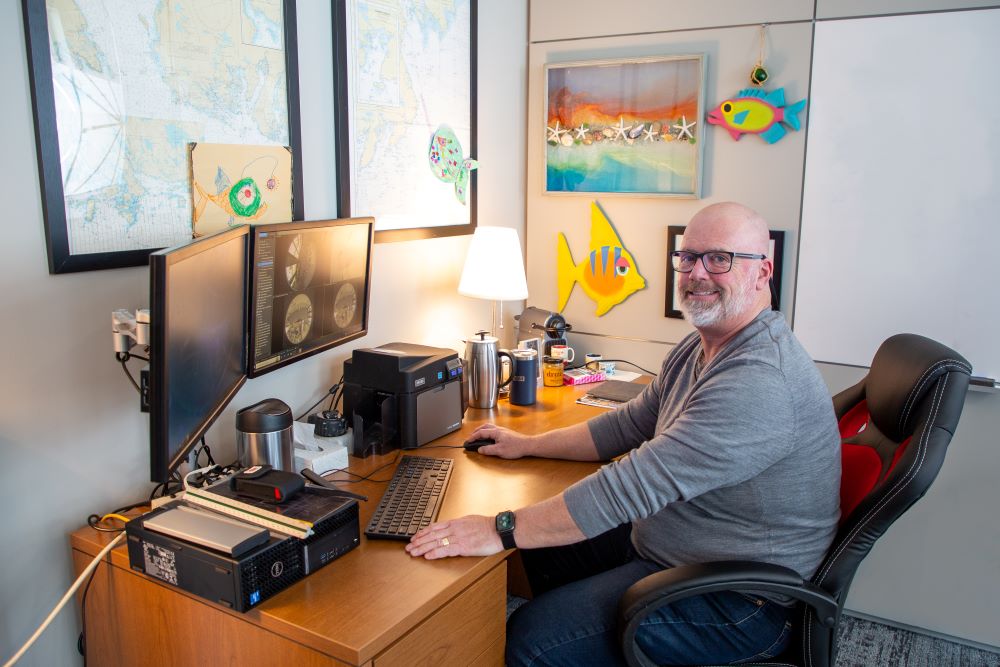
Keycards and cameras are a couple common ways businesses can secure their facilities, but a successful security program goes beyond that. While the latest technologies are the foundation of any security unit, successful operations also require a robust security culture.
Over the years, SRC has cultivated a strong safety culture by ensuring that staff are engaged and involved in the shared responsibility of a safe workplace. Safety and security are interconnected—a secure workplace ensures staff safety and keeps operations running smoothly.
To foster a similar culture, with security as the focus, SRC started Security Week to raise awareness about the importance of keeping operations secure and how employees can contribute to that goal.
Leadership is key to a successful security unit
Philip Rees is the face of security at SRC. He has been with SRC since 2013. As Chief Security Officer and Facilities Manager, Rees is responsible for maintaining and providing security for the Council's various locations and facilities.
Rees has been actively involved in security and facilities operations for decades. From the tech industry to the insurance industry, he has a wide range of experience in keeping organizations safe and operational.
Rees was first introduced to the security sector while building national and international call centres.
“At call centres, you’re dealing with credit card information, dealing with a lot of personal information for clients,” says Rees. “So, there is a high need for monitoring and maintaining information security.”
Rees has formal training from the Justice Institute of British Columbia and has experience in emergency management, which prepared him for managing unexpected events. Being able to make quick, informed decisions and respond swiftly is crucial for facility security and operations management.
An ever-evolving sector
Security at SRC has evolved over the years.
Much of the work currently done at SRC requires a high level of security. Rees says that these areas have been the main driver for change.
“We’ve moved into cannabis testing, rare earth processing, and we have a diamond lab—our clients need to trust that their samples are secure with us,” says Rees. “We need to ensure that our security meets their requirements, as well as our own.”
Figuring out the best way to address security needs is an ongoing process. SRC strives to be ahead of the curve when it comes to security, looking to implement the best solutions for clients and employees.
“It’s an approach that starts with meeting the guidelines, but also looking for ways to reach that next level of security,” says Rees. “We always want to make sure we go above and beyond to safeguard equipment, people and information.”
Keeping a close eye on things
Rees and the security team rely on technology to keep SRC’s offices, labs and facilities secure. Entry to buildings and lab spaces is tightly controlled with assigned access levels and close monitoring of who is coming and going.
Rees says that keycards are a useful technology that allow his team to monitor movement and access to different areas, but they are one of many aspects of facility security.
“In the last couple of years standard video surveillance has taken a step forward in terms of the artificial intelligence built into them,” says Rees. “They’ve gotten a lot better at identifying people who shouldn’t be on the property.”
One example of this new technology is a feature that alerts potential intruders that they have been spotted.
“If there is a break in, we want to be able to track them but also alert them that they have been spotted—whether it’s through a sound or visual cue, that lets them know the police are on their way,” says Rees.
While technology remains an important tool for security units, keeping a facility secure is a team effort. SRC has a strong working relationship with police and private security teams who offer input and recommend solutions to address the Council’s needs.
However, for Rees, getting employees involved is crucial to maintaining solid security operations.

Safety and security go hand in hand
Rees says the biggest challenge is getting people thinking about and engaging in security operations in all aspects of their work.
“Changing the mindset of staff from ‘this is a place to work’ to ‘this is a place I need to be involved in safeguarding’ is really the first step,” says Rees.
Education and awareness campaigns like SRC’s Security Week are ways for employees to take an active role. Fostering a security culture means that employees recognize potential threats and can effectively report and communicate these risks to Rees and his team.
SRC’s successful safety reporting system is being used as a blueprint for security services, helping make it easier for staff to report any suspicious activity.
“There is a saying that if you have a gut feeling that something isn’t quite right, nine times out of ten your gut is right,” says Rees. “Getting employees comfortable with taking action and providing training to encourage this behaviour is important, so when employees are faced with a situation that doesn’t feel right, they’re more confident submitting an incident report.”
Identifying and reporting potential issues contributes to developing a safety and security-first mindset.
Incident reports also play a role in helping Rees identify and take steps to address issues before they become a major problem.
Never a dull moment
Rees has addressed a lot of security challenges during his nine years at SRC. As the Council expands into new and exciting areas of research, Rees is making sure that SRC’s facility, employees and intellectual property are protected.
This is a multi-pronged approach that includes identifying new issues, staying ahead of threats and implementing tighter controls—all which require knowledge, teamwork and new technology.
“Keeping our labs and corporate offices secure is crucial, but keeping our staff safe is essential,” says Rees.
